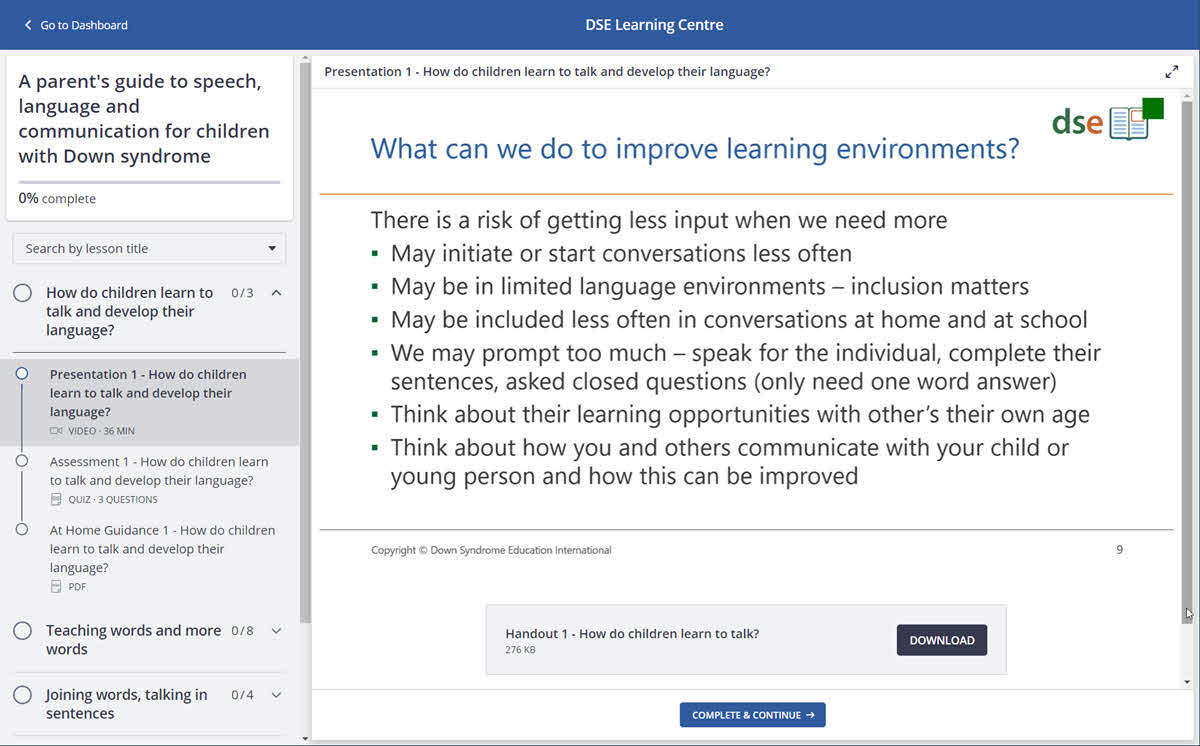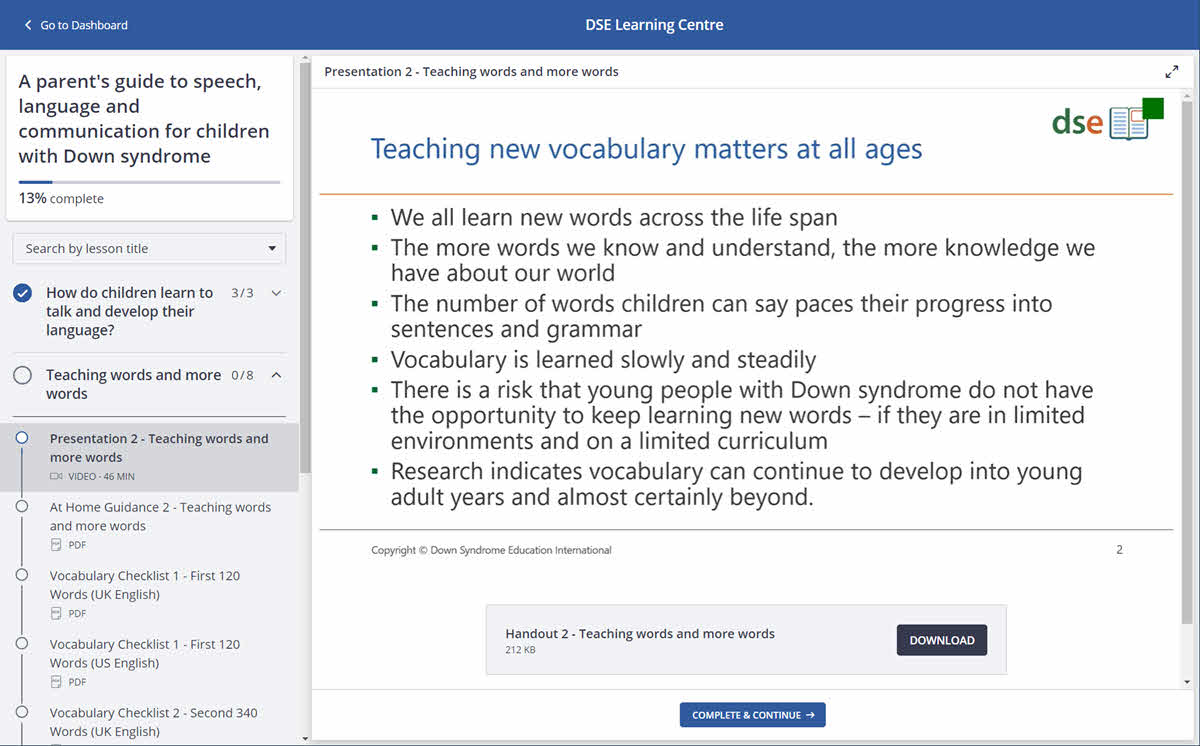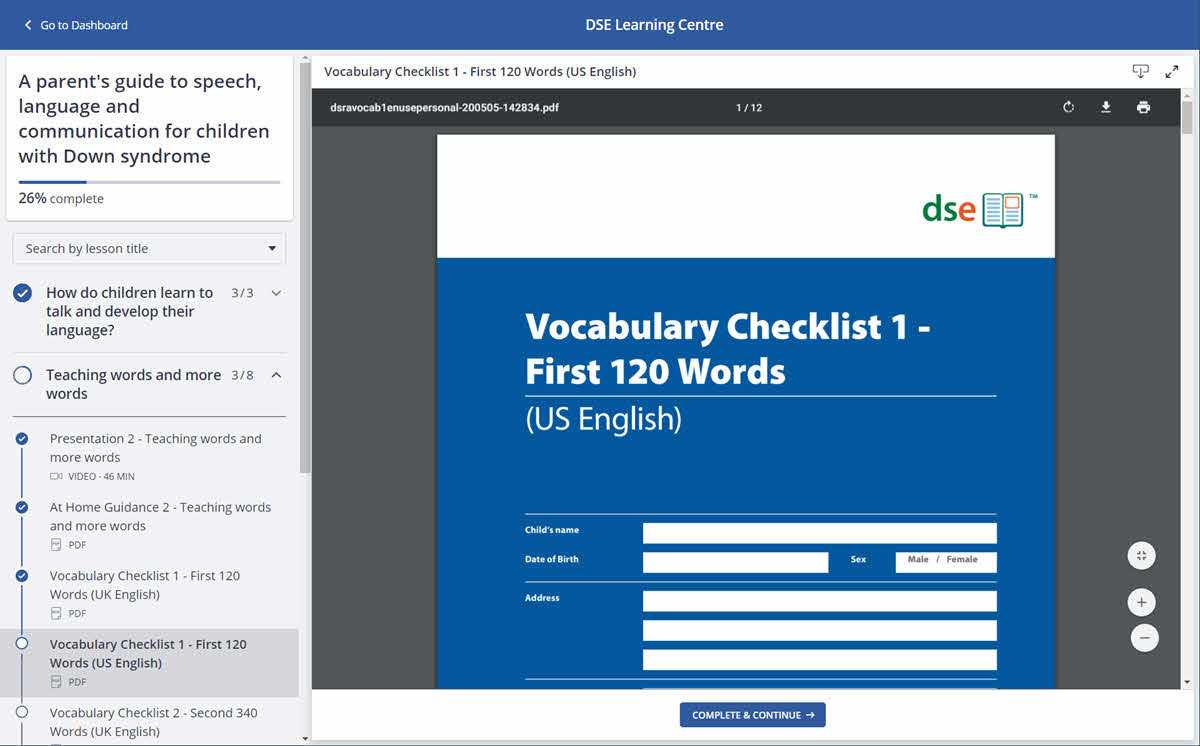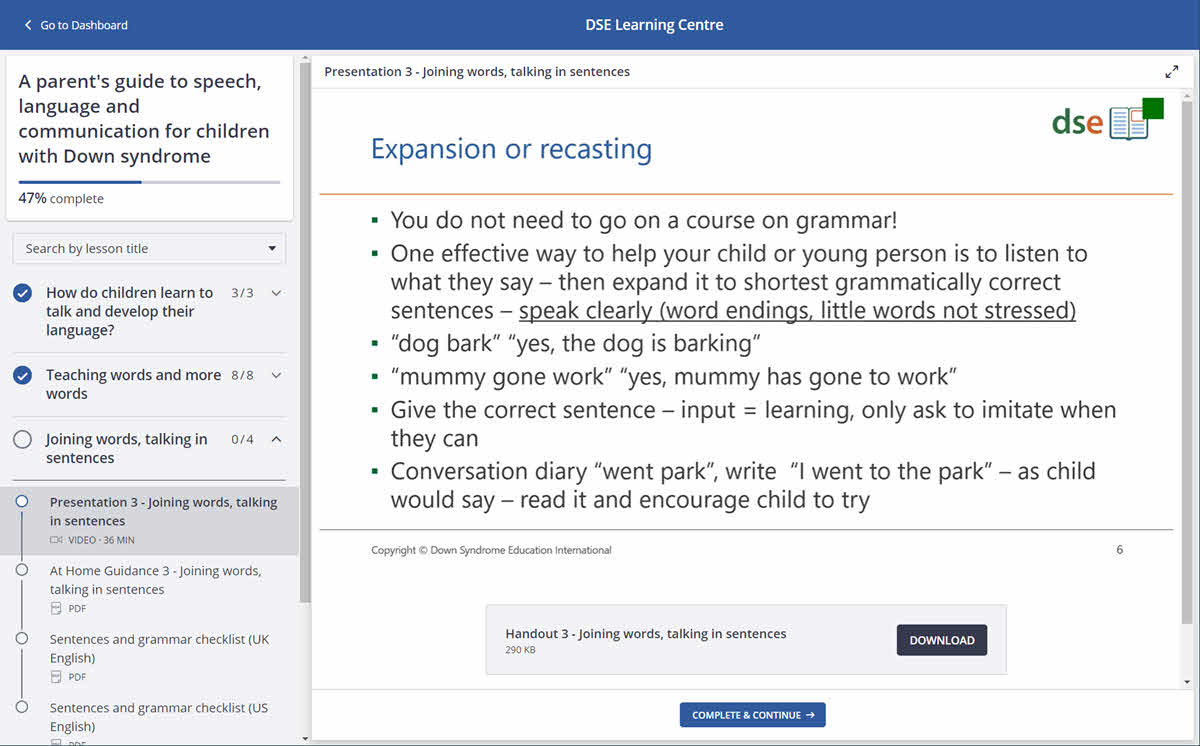A parent's guide to speech, language and communication for children with Down syndrome
This online course is designed to help parents provide practical support to develop the speech, language and communication skills of young people with Down syndrome from birth to adult life.
On this page:
The aim of this course is to help parents to understand speech, language and communication development for children and young people with Down syndrome and give them practical guidance on how they can help them to move forward. Babies, children, teenagers and young adults are learning to communicate and to talk all day every day. Parents are the first and best language teachers for all children and have an even more important role to play when their child has speech and language delays. Research suggests that when we show parents how to deliver interventions, the benefits can last longer. Many young people with Down syndrome can continue to improve their speech, language and communication skills into adult years.
Presented and led by Professor Sue Buckley OBE, this course includes five modules. Each module includes a 30-40 minute video presentation which sets out the key information on the topic, and At Home Guidance which sets out the principles for effective interventions and how to design practical activities for an individual child or young person, depending on the stage they have reached. The course materials also include six DSE Language Records for tracking children's progress and selecting teaching targets. The record forms track across the four components that underpin becoming an effective communicator - vocabulary, sentences and grammar, speech and communication. Activities are designed to be easily implemented at home.
Children and young people with Down syndrome vary widely in their needs and rates of progress. Some teenagers will be at the same stage in communication development as some younger children. However, the order in which all children progress and the principles which guide effective interventions are the same at all stages. The course therefore offers guidance covering development from the first months of life to early adult years and considers the needs of those who are most delayed. While the course contains five modules which can be completed in five weeks, the content and materials will support a young person's development over many years.

Contents
The following modules are included in this course:
- How do children learn to talk and develop language? - This module explains how children learn to talk and how this depends on building communication, speech, and language (vocabulary, sentences and grammar) from infancy to adult life. It describes the ways in which having Down syndrome may influence progress and factors that may be barriers to learning. It identifies that progress is influenced by the quantity and quality of language learning opportunities children have, concluding that we need to address both the child's learning needs and the environmental factors that make a difference.
- Teaching words and more words - This module focusses on how we teach children vocabulary. In order to communicate, children need to understand words and then sign or say them. Children learn many hundreds of words during daily conversations, but those with Down syndrome may need extra teaching and practice to learn words and build their vocabulary. The more words children know, the more they can talk about and new words are learned through school and into adult years, provided young people are given opportunities to go on learning. Vocabulary progress also influences learning sentences and reading progress.
- Joining words, talking in sentences - This module focusses on how we develop sentences and grammar. As children's vocabularies grow, they progress from using single words to communicate to joining words together once they have some 50-100 words or signs. They begin to develop full sentences and master the rules for grammar when they have some 300+ words. This pattern is the same for children with Down syndrome, but many will be in primary/elementary school by the time they have learned 300+ different words and are ready to learn grammar. Many teenagers are still learning to talk in sentences and have limited grammar but can still make further progress.
- Hearing speech sounds and developing clear speech - This module focuses on how to develop children's speech sound perception and clear speech production. Many young people with Down syndrome have unclear speech which means they are often not understood outside the family and those who know them well. Speech development is dependent on learning the speech sounds of your language and being able to hear the differences between them. This matters as the basis for talking but also for learning to understand words as many only vary by one sound but each has a different meaning. It takes time and practice to learn to say words clearly - up to 8 years of age for most children and longer for those with Down syndrome.
- Developing communication - When children have developed some communication skills with words, signs and sentences, we need to ensure that they can use them effectively to communicate with others. It takes children with Down syndrome time to become competent communicators and it is influenced by language, verbal memory and speech issues. There are strategies that we can use to help them improve their communications across a range of social settings and make full use of the skills they do have. This will increase independence and inclusion in the family, school, community and workplace. We can also increase the conversational experiences they have and the responsiveness of those they want to talk to - at whatever age or stage in communicating they have reached.

Features
This course features:
- Video presentations - lasting between 30 and 40 minutes, available to course participants for streaming on-demand
- Handouts - download copies of the slides in the presentation to work through
- 'At Home' Guidance - to help you consider how the information we have discussed in the presentations applies to your baby, child or young person with Down syndrome
- DSE Language Records - for tracking children's progress and selecting teaching targets
- Certificate of achievement - certificate for participants who successfully complete the course
Course duration
The course requires a minimum of 20 hours of study in order to complete the practical activities for each module.
Access to the course is available as a monthly subscription or a single purchase of 12 months.


How to book
You can purchase access to our online courses via our subscriptions website .
Help with online courses and subscriptions
Please visit our support site for additional help with online courses and subscriptions.

